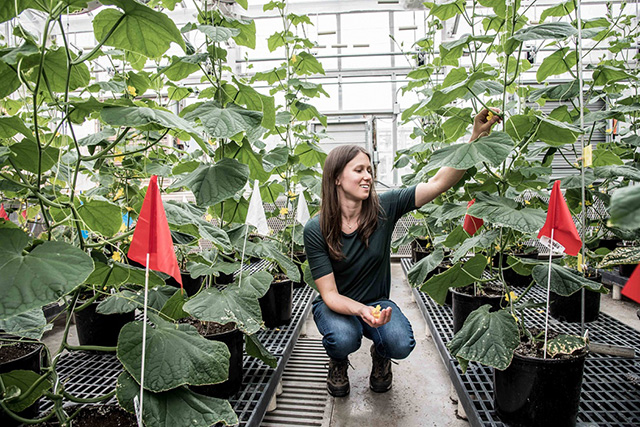
Excerpted from article by Melanie Greaver Cordova in CALS News [2017-06-29]
Plant breeding graduate student Lauren Brzozowski’s research is giving farmers access to more resilient breeding lines as she ultimately works to develop new cucumber and squash varieties that can be cultivated without pesticides. Her work with organic breeding systems earned her a fellowship from the Seed Matters Initiative of the Clif Bar Family Foundation, which funds graduate students working for organic systems by breeding better varieties of plants. Seed Matters works toward crop diversity as well as improving education and research in the agricultural sector.
Brzozowski is working with Michael Mazourek, assistant professor of plant breeding and horticulture in the College of Agriculture and Life Sciences’ School of Integrative Plant Science, to develop more resilient cucumbers and other vegetables, such as variegated snacking peppers and summer squash. The striped cucumber beetle is similarly destructive in summer squash, not only defoliating the plants, but transmitting diseases as well.
“Lauren’s work highlights the importance of innovation in organic agriculture for all agricultural systems,” Mazourek said. “By working on alternatives to chemical disease and insect control, we can have solutions now for organic growers that are adopted by conventional growers as well when their use of pesticides becomes restricted or loses effectiveness.”
“Organic growers don’t have a lot of the same tools as conventional growers for addressing many of the problems they face on the farm,” Brzozowski said. “We really need resistant varieties to help all farmers succeed.”
Brzozowski became hooked on plant breeding as a way to increase the sustainability of agricultural systems. She uses her background in engineering and horticulture to develop crops that benefit farmers: “You get to use science and math to bring together basic research into something that can be applied and tangible for growers. It’s thrilling.”


